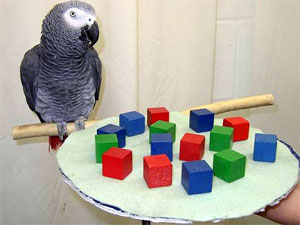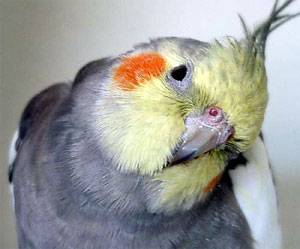 Image from Wikipedia, originally from socialfiction.orgI'm in mourning: In early September, Alex the African grey parrot mysteriously died. I never met Alex personally, but I've heard him speak. Yes, he spoke. He also counted. And he could tell you which of a pair of keys was the bigger one, or the yellow one. He was the specially trained subject of the Avian Learning Experiment (thus his name), and for us animal lovers, Alex offered some evidence that the sentience we perceive in our furry and feathered friends may be for real.
Image from Wikipedia, originally from socialfiction.orgI'm in mourning: In early September, Alex the African grey parrot mysteriously died. I never met Alex personally, but I've heard him speak. Yes, he spoke. He also counted. And he could tell you which of a pair of keys was the bigger one, or the yellow one. He was the specially trained subject of the Avian Learning Experiment (thus his name), and for us animal lovers, Alex offered some evidence that the sentience we perceive in our furry and feathered friends may be for real.
For 30 years, Brandeis University professor Irene Pepperberg worked with Alex, and wrote many papers describing what she saw as an ability to learn and use language and numbers. Alex had a vocabulary of over 100 English words, could count to six, and could pick out objects based on their colors, shapes and the material there were made of. Alex and Dr. Pepperberg weren't without their skeptics. Some scientists insist that what seemed like communicative ability was simply Alex picking up on and responding to cues or gestures that his researchers were unaware they were making.
The jury's still out on parrot intelligence, but there’s no question that Alex and Dr. Pepperberg have made many people wonder whether animals have more going on upstairs than we recognize.
It's known that birds give different calls for different purposes. Does that mean birds have intent? Are they aware of their desires?
 Iggy the cockatiel-- thinking?I confess, I've got a bias of my own in this regard. I have a pet cockatiel who, I'm certain, is much smarter than I give him credit for. Of course I like to think that my adorable Iggy the Cockatiel learns things and has a distinct personality, even though some scientists would disagree. For example, Iggy decidedly prefers my roommate to me. Whenever she and I are both home and he's out of his cage, he'll make his way to whatever room she's in, sometimes clear across our sizable apartment, in an effort to be with her. I never saw him do this regularly for anyone else, and he seldom makes the return journey to hang out with me (I try not to take it too personally). He plainly seems to desire my roomie's shoulder and have an intention to hang out with her.
Iggy the cockatiel-- thinking?I confess, I've got a bias of my own in this regard. I have a pet cockatiel who, I'm certain, is much smarter than I give him credit for. Of course I like to think that my adorable Iggy the Cockatiel learns things and has a distinct personality, even though some scientists would disagree. For example, Iggy decidedly prefers my roommate to me. Whenever she and I are both home and he's out of his cage, he'll make his way to whatever room she's in, sometimes clear across our sizable apartment, in an effort to be with her. I never saw him do this regularly for anyone else, and he seldom makes the return journey to hang out with me (I try not to take it too personally). He plainly seems to desire my roomie's shoulder and have an intention to hang out with her.
